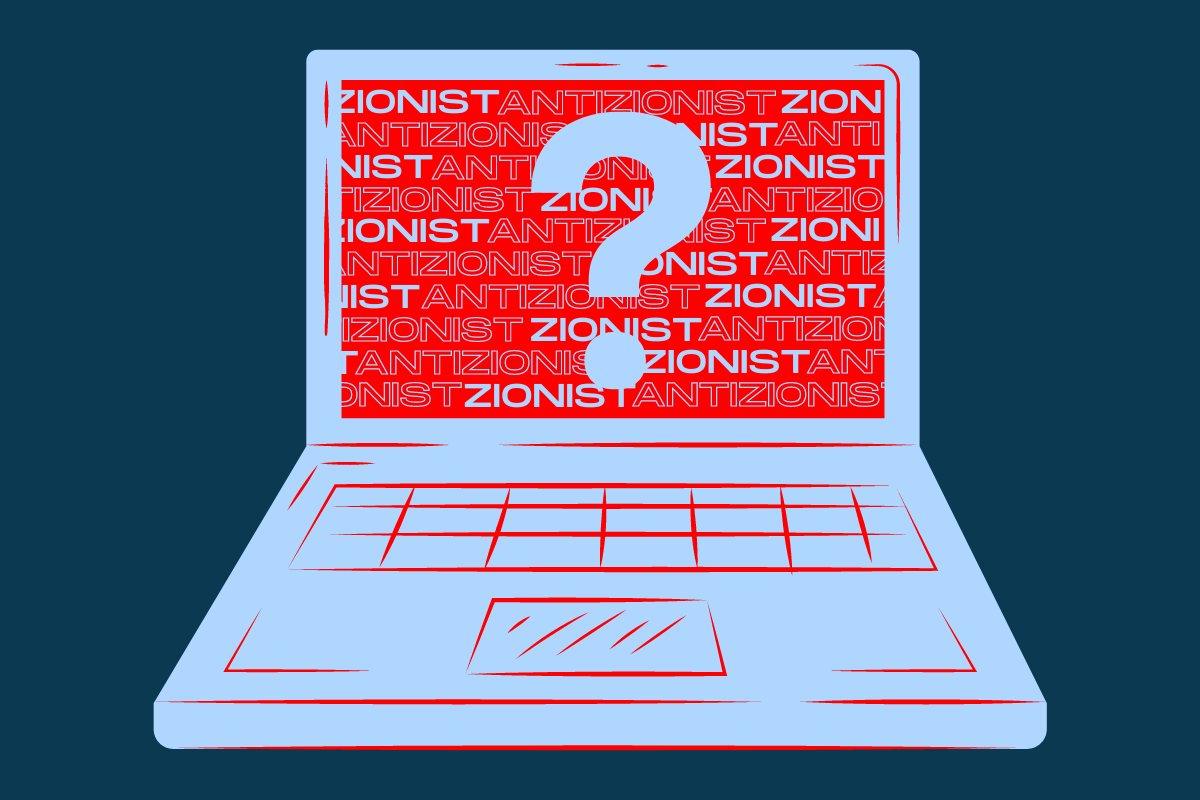Are you a Zionist or an anti-Zionist? Depending on who’s asking and your answer, you could find yourself embraced or cast out, trusted or scorned. Zionists and anti-Zionists might hear that they’re Nazis, or that they’re acting for the well-being of the Jewish people, or that they’re completely ignoring history, or that they’re standing up for justice. But what do these two terms actually mean for our Jewish community, particularly in this terrible time since October 7?
Not to get all college essay on you, but the use of “Zionism” as a term was first noted in the Oxford English Dictionary (the OED to nerds like me) in 1896, although the idea behind it is of course far older. The OED defines Zionism as follows:
“1896– Originally: a movement among Jewish people for the re-establishment of a Jewish nation in Palestine. Later: a movement for the development and protection of the state of Israel. Also: advocacy of or support for this. Zionism was established as a political movement in 1897 at the initiative of Theodor Herzl (1860–1904). The state of Israel was established in 1948.”
Some may think of anti-Zionism as a relatively modern phenomenon, but it’s been around as long as Zionism, with its first evidence in the OED coming in 1899. Of course, its definition “Opposition to Zionism” doesn’t really help us to properly define either term.
And besides, the meaning of words evolve over time, right? With that in mind, a couple of weeks ago, I posed two questions to my mostly Jewish Instagram followers:
- How do you define Zionism?
- How do you define anti-Zionism?
Here are just a few of the definitions folks offered.
Zionism is:
- Jewish self-determination in our indigenous homeland
- A belief in a democratic Jewish state in the heart of Israel
- The national liberation movement of the Jewish people
- Jewish self-determination and democracy unfortunately assaulted by right-wing nationalism
Anti-Zionism is:
- Saying that Israel should cease to exist as a country
- The belief that Jews should not have a state (which is different from criticizing Israeli politics)
- Opposition to the oppressive policies of the state of Israel
- Beliefs and actions trying to bring more equality, freedom and indigenous rights there
But enough with the official definitions. That’s not really what this is about.
The truth is that I don’t believe that there is such a thing as a completely objective definition of Zionism or anti-Zionism. We all come to these loaded terms (and they are both loaded, especially now) with baggage from our vantage points — baggage piled on by our particular Jewish communities or lack thereof, by the Israel and Palestine we’ve witnessed in our lifetimes, by our personal proximity to the Holocaust, by our courses of study and by the activist circles we opt in or out of.
I’ve heard people who identify as Zionist and who identify as anti-Zionist say the same thing about what they think should happen in Israel and Palestine. I’ve heard people who are anti-Zionists identify with what I would describe as Zionist views, and I’ve heard people who are Zionists advocate for what I would describe as anti-Zionist positions.
So this isn’t about official definitions. This is about the lines we’re drawing within the Jewish community, and between the Jewish community and communities we’ve allied with for decades, that may be keeping us from confronting the issues before us.
I know I’m not the only one thinking about and frustrated by the conversations that aren’t taking place because Zionists don’t want to associate with anti-Zionists and vice versa. As Lux Alptraum wrote in The Forward last week, “If two people can agree that they want peace and freedom for both Palestinians and Israelis, does it matter if one of them identifies as Zionist and the other anti-Zionist?”
Let’s be clear: There are absolutely Zionists who believe that Palestinians deserve nothing, that the entire land legally classified as Israel and the Palestinian territories should be under full Israeli control, and that Palestinians and Arab Israelis should be expelled or killed. And there are absolutely anti-Zionists who believe that Israelis deserve nothing, that the entire land legally classified as Israel and the Palestinian territories should be under full Palestinian control, and that Jewish Israelis should be expelled or killed. But there are also many people who want both Israelis and Palestinians to be safe, in one state or two, with self-determination and prosperity for every resident.
There’s been so much asked of the Jewish community since October 7, 2023. “Defend Israel!” “Speak up for Palestine!” “Stand with your global family of Jews!” “Don’t let the Jewish nation commit atrocities in your name!” “Tell me [non-Jewish friend/family] what I should be doing.” And we’re far from the only people who’ve had far too much put on us for these last 100 days. I hate to ask more, but here is my ask:
The next time you hear someone self-describe as a Zionist or anti-Zionist, I want you to do something vulnerable. I want you to ask the other person what that term means to them, and I want you to really listen to their answer, and then ask if you can share your own. It could be that the two of you don’t see eye to eye at all, that you are working for entirely different futures for Israelis and Palestinians, and that asking for clarifications will only further cement your differences. But it could also be that you realize you aren’t so different after all. It could be that you can teach and learn from one another. It could be that you could become allies in the pursuit of a lasting, just peace after too many decades of war. You won’t know unless you ask.
More than 100 days into this horror, surely the conversation is worth the risk.



